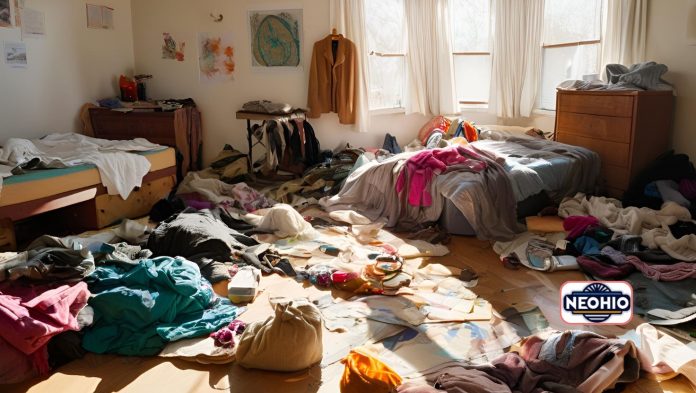Parents battling the endless war against their children’s messy bedrooms might be fighting for more than just household cleanliness—they could be shaping lifelong habits, according to multiple research studies.
While no definitive longitudinal study has specifically tracked the relationship from childhood to adulthood, existing research suggests strong connections between early organizational habits and adult living spaces.
“Implementing routine habits of cleanliness and organization as early as you can in childhood” is crucial for developing lasting habits, says professional organizer Jamie Hord of Horderly Professional Organizing. “It’s always easier to keep a space clean when it’s organized.”
Hord emphasizes that parents should “set a good example by keeping your own spaces and the rest of the house neat and clean,” as children often model behaviors they observe.
The Developmental Importance of Messiness
Psychologist Carl E. Pickhardt points out that messy rooms during adolescence, particularly between ages 9-13, often represent important developmental milestones related to “independence, individuality, and opposition to parental rules.”
“By insisting on regular room clean up, you let it be known that your child must live on your terms so long as he or she is dependent on your care,” Pickhardt notes. “She can live on independent terms when she is out on her own.”
Mental Health Connections
The impact of cleanliness habits extends beyond mere tidiness. Research from UCLA’s Center on Everyday Lives and Families found a direct link between cluttered homes and elevated stress hormone levels, particularly in women.
In a study of 32 families, researchers discovered that women living amidst a high density of household objects showed increased cortisol levels, indicating that clutter has profound effects on mood and self-esteem.
NiCole Keith, PhD, a research scientist at Indiana University, conducted a study showing that people with clean houses tend to be healthier than those with messy homes. Surprisingly, home cleanliness was an even stronger predictor of good health than neighborhood walkability.
“Clutter makes you distracted and unable to process information as well as you do in an uncluttered, organized, and serene environment,” according to researchers who used functional magnetic resonance imaging to study brain responses to organized versus disorganized environments.
The Creative Upside of Mess
Not all messiness is detrimental, however. Kathleen Vohs, PhD, and fellow researchers found that while orderly spaces encouraged behaviors like generosity and healthy eating, messy environments actually enhanced creativity.
“Working in a messy space relaxes the need to follow social norms and expectations,” the researchers explained, noting that participants in disorganized rooms generated more innovative ideas during creative tasks.
Establishing Healthy Habits
Child psychology experts suggest that messy rooms often result from several factors including lack of structure, feeling overwhelmed, poor motivation, and underdeveloped time management skills.
“Teaching these skills is a gradual process, and it requires patience and consistency,” notes Jane Fern of the Spark Joy Collective. “With time, children will develop habits of cleanliness and organization that will benefit them throughout their lives.”
For parents battling bedroom chaos, experts recommend:
- Breaking cleaning tasks into smaller, manageable steps
- Creating consistent cleaning schedules rather than random requests
- Modeling organized behavior in shared spaces
- Allowing some creative messiness while maintaining basic cleanliness standards
- Offering positive, specific feedback when children clean up successfully
Craig Hoareau, owner of A Tidy Mind – London, emphasizes that “adults in the household should ensure they take part in and become a model of behavior – you can’t expect your children to do something if you’re not making the same efforts.”
Whether your child’s room resembles a disaster zone or a picture of perfection, the research suggests these early habits may follow them well into adulthood—for better or worse.
Got a parenting or household tip to share? Email us at desk@neohio.news or leave a message at our news desk at 216-510-9074.











